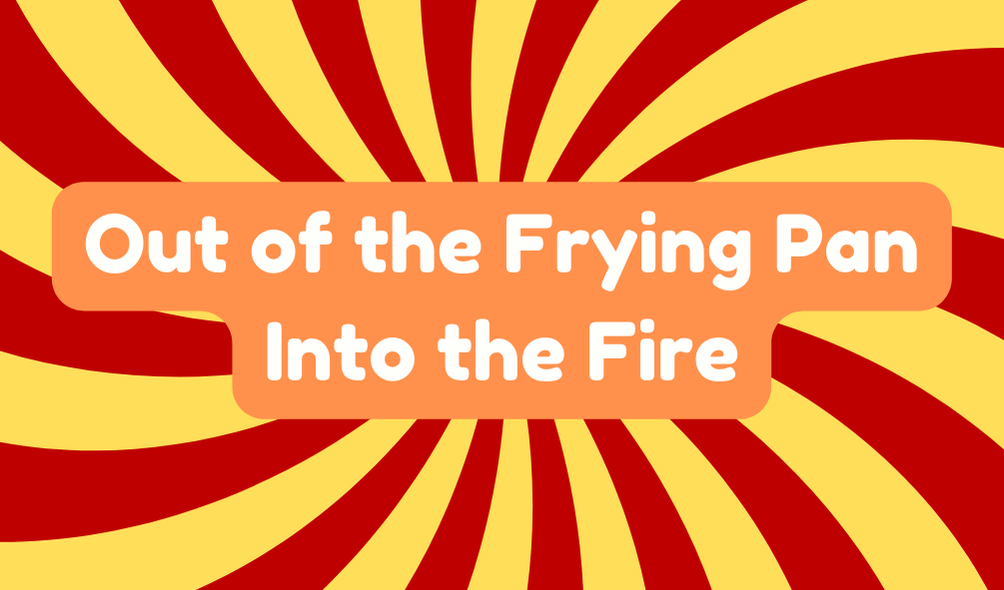You might have coincidentally found yourself in a situation where a simple change spiraled into a series of unexpected complications. It's easy to rush into decisions, thinking you're escaping one dilemma only to land smack in the middle of another. This phenomenon, often framed by the phrase "out of the frying pan into the fire," invites us to reconsider our approach to problem-solving. What's the real cost of seeking a quick fix, and how can we better navigate these choices? Understanding the implications might just change how you face your next challenge.
What Does It Mean?
The phrase "out of the frying pan into the fire" captures the essence of escaping one challenging situation only to find yourself in an even worse predicament. It symbolizes those critical shifts in life where you attempt to solve a problem, only to trigger a negative escalation of difficulties. You might think that changing your situation will lead to better outcomes, yet often, it plummets you deeper into trouble. For instance, you might leave a toxic job, only to land in an even more stressful environment. This phrase highlights the irony of our decisions, reminding you that not all changes result in improvement. It's a cautionary tale about the complexities of problem-solving and the paths we choose to take.
Synonyms
Several phrases capture the essence of "out of the frying pan into the fire," conveying similar meanings of shifting from one troubling situation to an even more dire one. You might hear people use these synonym phrases and alternative expressions in various situations:
- From bad to worse – Commonly used to describe an escalation in trouble.
- Out of the frying pan and into the fire – Directly mirrors the original phrase, emphasizing the irony of escaping one issue only to encounter another.
- Jumping from the skillet to the flames – A vivid alternative that highlights the dangers involved in such changes.
Recognizing these expressions can enhance your understanding and appreciation of how we communicate life's complexities, especially when it feels like problems multiply instead of resolve.
Example of Sentences
Many people come across situations where they realize that escaping one dilemma can lead them straight into another, often worse, problem. This "out of the frying pan into the fire" experience isn't just a saying; it's reflected in real life scenarios that we all encounter. Here are a few illustrative examples:
- "A bid for independence resulted in jumping out of the frying pan into the fire."
- "Transitioning to a new school felt like jumping from the frying pan into the fire."
- "Attempting to repair an old pipe led straight out of the frying pan and into the fire."
These sentences show the emotional impact of trying to escape trouble, only to find yourself in a worse spot. Always consider the risks when seeking a way out.
Origin
Originating from ancient Greek poetry, the phrase "out of the frying pan into the fire" vividly illustrates the irony of seeking escape from one danger only to encounter a greater one. Its historical usage traces back to tales told by Caesar Germanicus, where a hare finds itself in perilous situations. This imagery resonated, reflecting the human condition in times of crisis. Moreover, Latin sailors adopted the phrase, emphasizing the choices made under duress. Its cultural significance lies in the way it showcases misguided attempts to evade hardships, often escalating potential disasters. By understanding its roots, you gain insight into the real challenges of steering through life's dangers, highlighting a timeless cautionary tale that still holds relevance today.
Collocations
Understanding the phrase "out of the frying pan into the fire" gains depth when considering its collocations. These pairings not only enhance meaning but also reflect how you might encounter escalating dilemmas. Here are three key collocations:
- Jumping from – It indicates a sudden leap into a more severe issue.
- Falling into – This expresses an unexpected slide into trouble after attempting to escape.
- Caught in – It summarizes a situation of being stuck between two worsening challenges.
These idiomatic expressions reveal a deeper level of reality. You might find that, in trying to dodge one problem, you inadvertently tumble into another, showcasing the complexity of life's decisions. Embracing these collocations can sharpen your understanding and awareness.
How to Use in Everyday Language
Steering through life's challenges often feels like a delicate dance, where one misstep can lead to deeper troubles. Using the phrase "out of the frying pan into the fire" can provide practical usage in everyday language, especially when managing common contexts like work or personal relationships. For instance, if you leave one stressful job only to find another that's even worse, you'd describe that experience as jumping from the frying pan into the fire. Recognizing when this occurs in your life allows you to reflect, reassess, and make better choices. Be cautious, though; it's easy to underestimate how quickly things can escalate. This awareness can help you communicate your experiences more vividly, bridging the gap between frustration and understanding.
Why Is It Still Relevant Today?
The phrase "out of the frying pan into the fire" remains relevant today because it captures a universal human experience: the struggle to escape one difficult situation only to find oneself in a worse one. This idiom has cultural significance, illustrating how people often make decisions with the hope of improvement, only to face greater adversity. In modern applications, you might see this in career changes that lead to more stress or in high-stakes investments that backfire. Its continued use in discussions around risk and decision-making reflects our tendency to overlook potential pitfalls in favor of fleeting relief. By understanding its implications, you can navigate life's challenges more wisely and avoid the traps of easy escapes that lead nowhere good.
Frequently Asked Questions
What Are the Historical Uses of This Idiom?
The idiom's historical origins trace back to ancient Greek poetry and Aesop's fables, showcasing literary examples of misguided escapes. You'll find its evolution in various cultures, emphasizing the irony of fleeing danger only to encounter worse.
How Has the Phrase Evolved Over Time?
You'll see this phrase evolved considerably, from its ancient Greek origins to contemporary usage. Its idiom evolution highlights how society recognizes the irony of escaping one negative situation only to encounter another.
Are There Similar Phrases in Other Languages?
When you explore idioms, you'll discover similar phrases across cultures. Every saying packs cultural significance, reflecting struggles. These expressions create a tapestry of understanding life's changes, illuminating our shared human experience in innovative ways.
Can This Idiom Be Used in Formal Writing?
You can use this idiom in formal writing, but it's best to guarantee the context is clear. Depending on your audience, idiomatic expressions can enhance creativity, yet they may also detract from a formal tone.
What Disciplines Study Idiomatic Expressions Like This One?
When you plunge into linguistic studies and idiomatic analysis, you'll discover a treasure trove of emotions and insights. Exploring these phrases reveals deep cultural narratives, igniting innovative discussions that resonate through language and daily life.







